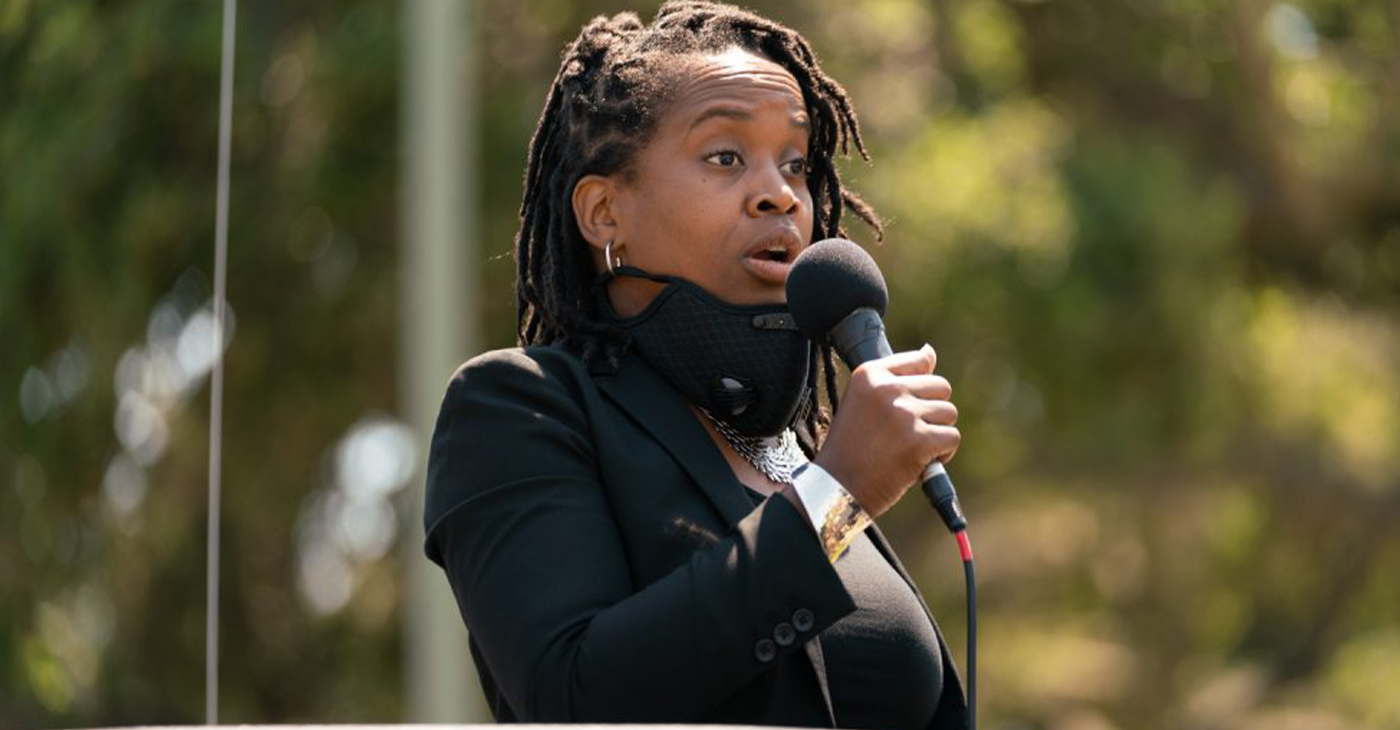Politics
Chicago Mayor Rahm Emanuel Wins 2nd Term in Runoff Victory

Chicago Mayor Rahm Emanuel celebrates a victorious election night at Plumbers Local 130 Union Hall, Tuesday, April 7, 2015, in Chicago. Emanuel won re-election Tuesday as voters in Chicagos first mayoral runoff decided that, despite his brusque management style, the former White House chief of staff was best equipped to deal with the dire financial challenges facing the nations third-largest city. (AP Photo/Nam Y. Huh)
SOPHIA TAREEN, Associated Press
SARA BURNETT, Associated Press
CHICAGO (AP) — Rahm Emanuel won re-election Tuesday as voters in Chicago’s first mayoral runoff decided that, despite his brusque management style, the former White House chief of staff was best equipped to deal with the many dire challenges facing the nation’s third-largest city.
Emanuel was forced to campaign furiously across the city to beat Cook County Commissioner Jesus “Chuy” Garcia after failing to capture a majority against four other candidates in a February election. The mayoral runoff was the first since the city changed the way it conducts elections about 20 years ago.
“To all the voters I want to thank you for putting me through my paces,” Emanuel told supporters Tuesday night. “I will be a better mayor because of that. I will carry your voices, your concerns into … the mayor’s office.”
With nearly all voting precincts reporting results, Emanuel had about 56 percent of the vote compared to around 44 percent for Garcia.
“We didn’t lose today, we tried,” Garcia told supporters gathered at the University of Illinois at Chicago. “We fought hard for what we believed in. You don’t succeed at this or anything else unless you try.”
The incumbent highlighted tough decisions he’s made since succeeding former Mayor Richard M. Daley in 2011, but admitted that his management approach too often rubbed city residents the wrong way. He portrayed Garcia as too inexperienced to handle the city’s financial crunch.
Many of those heading to the polls Tuesday said the election should be a signal.
“Hopefully he (Emanuel) takes heed of the runoff when he should have been a shoo-in,” said Richard Rowe, a 50-year-old, who planned to vote for the incumbent.
Jesus Fernandez, a 44-year-old window washer who voted for Garcia, had the same view.
“If he (Garcia) gets close, we might push Rahm to do something,” Fernandez said. “At least we push him a little bit.”
Emanuel raised far more money than Garcia, plastered the airwaves with ads and had support from his former boss, President Barack Obama, who cast an early ballot for him from Washington.
The mayor faces huge obstacles in his second term, from fixing the worst-funded pension systems of any big U.S. city to stemming stubborn violence and confronting labor unions that just spent millions trying to defeat him.
Chicago’s four pension systems are about $20 billion in debt, and the fund for Chicago Public Schools teachers is short about $7 billion of what’s needed to pay benefits as promised.
If Emanuel can’t work a deal with labor unions or get the Illinois Legislature to approve relief, the city is on the hook for an additional $550 million payment to the retirement accounts, bringing the total payment to about $1 billion. He’s said that would be roughly equal to the annual cost of having 4,300 police officers on the street or raising property taxes by 150 percent.
Emanuel also must deal with ongoing concerns about crime, one of the areas Garcia hit him on repeatedly during the election. After a spike in homicides early in his first term, the number fell to the lowest level in a half-century though the number of shootings has climbed 12 percent.
“I’m proud of what we’ve accomplished in these past four years, but I understand the challenges we face will require me to approach them differently and to work in a different fashion,” Emanuel said. “The only way to meet these challenges is to bridge the gaps between the things that divide us and start focusing on the things that unite us and bring us together.”
Garcia, a former community organizer, alderman and state lawmaker, ran a campaign focused on the city’s neighborhoods, with support from teachers and unions upset with Emanuel. He accused the mayor of being out of touch with voters and blamed him for the fiscal problems, while playing up the mayor’s push to close about 50 schools and a gang violence problem that spiked during Emanuel’s first term.
He also vowed to end Chicago’s troubled red-light camera system, which some residents believe is discriminatory and focuses more on revenue than safety.
Election officials said more than 142,300 Chicago voters cast early ballots for the runoff, far outpacing early voting turnout in February and four years ago. Estimates Tuesday afternoon showed light voter turnout at roughly 28 percent, but election officials later predicted the final number would hover closer to 40 percent once all ballots were counted.
___
Follow Sophia Tareen at http://twitter.com/sophiatareen and Sara Burnett athttp://twitter.com/sara_burnett .
Copyright 2015 The Associated Press. All rights reserved. This material may not be published, broadcast, rewritten or redistributed.
Alameda County
Oakland Council Expands Citywide Security Cameras Despite Major Opposition
In a 7-1 vote in favor of the contract, with only District 3 Councilmember Carroll Fife voting no, the Council agreed to maintain its existing network of 291 cameras and add 40 new “pan-tilt-zoom cameras.”

By Post Staff
The Oakland City Council this week approved a $2.25 million contract with Flock Safety for a mass surveillance network of hundreds of security cameras to track vehicles in the city.
In a 7-1 vote in favor of the contract, with only District 3 Councilmember Carroll Fife voting no, the Council agreed to maintain its existing network of 291 cameras and add 40 new “pan-tilt-zoom cameras.”
In recent weeks hundreds of local residents have spoken against the camera system, raising concerns that data will be shared with immigration authorities and other federal agencies at a time when mass surveillance is growing across the country with little regard for individual rights.
The Flock network, supported by the Oakland Police Department, has the backing of residents and councilmembers who see it as an important tool to protect public safety.
“This system makes the Department more efficient as it allows for information related to disruptive/violent criminal activities to be captured … and allows for precise and focused enforcement,” OPD wrote in its proposal to City Council.
According to OPD, police made 232 arrests using data from Flock cameras between July 2024 and November of this year.
Based on the data, police say they recovered 68 guns, and utilizing the countywide system, they have found 1,100 stolen vehicles.
However, Flock’s cameras cast a wide net. The company’s cameras in Oakland last month captured license plate numbers and other information from about 1.4 million vehicles.
Speaking at Tuesday’s Council meeting, Fife was critical of her colleagues for signing a contract with a company that has been in the national spotlight for sharing data with federal agencies.
Flock’s cameras – which are automated license plate readers – have been used in tracking people who have had abortions, monitoring protesters, and aiding in deportation roundups.
“I don’t know how we get up and have several press conferences talking about how we are supportive of a sanctuary city status but then use a vendor that has been shown to have a direct relationship with (the U.S.) Border Control,” she said. “It doesn’t make sense to me.”
Several councilmembers who voted in favor of the contract said they supported the deal as long as some safeguards were written into the Council’s resolution.
“We’re not aiming for perfection,” said District 1 Councilmember Zac Unger. “This is not Orwellian facial recognition technology — that’s prohibited in Oakland. The road forward here is to add as many amendments as we can.”
Amendments passed by the Council prohibit OPD from sharing camera data with any other agencies for the purpose of “criminalizing reproductive or gender affirming healthcare” or for federal immigration enforcement. California state law also prohibits the sharing of license plate reader data with the federal government, and because Oakland’s sanctuary city status, OPD is not allowed to cooperate with immigration authorities.
A former member of Oakland’s Privacy Advisory Commission has sued OPD, alleging that it has violated its own rules around data sharing.
So far, OPD has shared Flock data with 50 other law enforcement agencies.
Activism
Families Across the U.S. Are Facing an ‘Affordability Crisis,’ Says United Way Bay Area
United Way’s Real Cost Measure data reveals that 27% of Bay Area households – more than 1 in 4 families – cannot afford essentials such as food, housing, childcare, transportation, and healthcare. A family of four needs $136,872 annually to cover these basic necessities, while two adults working full time at minimum wage earn only $69,326.

By Post Staff
A national poll released this week by Marist shows that 61% of Americans say the economy is not working well for them, while 70% report that their local area is not affordable. This marks the highest share of respondents expressing concern since the question was first asked in 2011.
According to United Way Bay Area (UWBA), the data underscores a growing reality in the region: more than 600,000 Bay Area households are working hard yet still cannot afford their basic needs.
Nationally, the Marist Poll found that rising prices are the top economic concern for 45% of Americans, followed by housing costs at 18%. In the Bay Area, however, that equation is reversed. Housing costs are the dominant driver of the affordability crisis.
United Way’s Real Cost Measure data reveals that 27% of Bay Area households – more than 1 in 4 families – cannot afford essentials such as food, housing, childcare, transportation, and healthcare. A family of four needs $136,872 annually to cover these basic necessities, while two adults working full time at minimum wage earn only $69,326.
“The national numbers confirm what we’re seeing every day through our 211 helpline and in communities across the region,” said Keisha Browder, CEO of United Way Bay Area. “People are working hard, but their paychecks simply aren’t keeping pace with the cost of living. This isn’t about individual failure; it’s about policy choices that leave too many of our neighbors one missed paycheck away from crisis.”
The Bay Area’s affordability crisis is particularly defined by extreme housing costs:
- Housing remains the No. 1 reason residents call UWBA’s 211 helpline, accounting for 49% of calls this year.
- Nearly 4 in 10 Bay Area households (35%) spend at least 30% of their income on housing, a level widely considered financially dangerous.
- Forty percent of households with children under age 6 fall below the Real Cost Measure.
- The impact is disproportionate: 49% of Latino households and 41% of Black households struggle to meet basic needs, compared to 15% of white households.
At the national level, the issue of affordability has also become a political flashpoint. In late 2025, President Donald Trump has increasingly referred to “affordability” as a “Democrat hoax” or “con job.” While he previously described himself as the “affordability president,” his recent messaging frames the term as a political tactic used by Democrats to assign blame for high prices.
The president has defended his administration by pointing to predecessors and asserting that prices are declining. However, many Americans remain unconvinced. The Marist Poll shows that 57% of respondents disapprove of Trump’s handling of the economy, while just 36% approve – his lowest approval rating on the issue across both terms in office.
Activism
Black Arts Movement Business District Named New Cultural District in California
Located in the heart of District 3, the BAMBD is widely regarded as one of the nation’s most important centers of Black cultural production — a space where artists, entrepreneurs, organizers, and cultural workers have shaped generations of local and national identity. The state’s recognition affirms the district’s historic importance and its future promise.

By Post Staff
Oakland’s Black Arts Movement Business District (BAMBD) has been selected as one of California’s 10 new state-designated Cultural Districts, a distinction awarded by the California Arts Council (CAC), according to a media statement released by Councilmember Carroll Fife.
The BAMBD now joins 23 other districts across the state recognized for their deep cultural legacy, artistic excellence, and contributions to California’s creative economy.
Located in the heart of District 3, the BAMBD is widely regarded as one of the nation’s most important centers of Black cultural production — a space where artists, entrepreneurs, organizers, and cultural workers have shaped generations of local and national identity. The state’s recognition affirms the district’s historic importance and its future promise.
“This designation is a testament to what Black Oakland has built — and what we continue to build when we insist on investing in our own cultural and economic power,” said Fife.
“For years, our community has fought for meaningful recognition and resources for the Black Arts Movement Business District,” she said. “This announcement validates that work and ensures that BAMBD receives the support it needs to grow, thrive, and continue shaping the cultural fabric of California.”
Since taking office, Fife has led and supported multiple initiatives that strengthened the groundwork for this achievement, including:
- Restoring and protecting arts and cultural staffing within the City of Oakland.
- Creating the West Oakland Community Fund to reinvest in historically excluded communities
- Advancing a Black New Deal study to expand economic opportunity for Black Oakland
- Ensuring racial equity impact analyses for development proposals, improving access for Black businesses and Black contractors
- Introduced legislation and budget amendments that formalized, protected, and expanded the BAMBD
“These efforts weren’t abstract,” Fife said. “They were intentional, coordinated, and rooted in a belief that Black arts and Black businesses deserve deep, sustained public investment.”
As part of the Cultural District designation, BAMBD will receive:
- $10,000 over two years
- Dedicated technical assistance
- Statewide marketing and branding support
- Official designation from Jan. 1, 2026, through Dec. 31, 2030
This support will elevate the visibility of BAMBD’s artists, cultural organizations, small businesses, and legacy institutions, while helping attract new investment to the district.
“The BAMBD has always been more than a district,” Fife continued. “This recognition by the State of California gives us another tool in the fight to preserve Black culture, build Black economic power, and protect the families and institutions that make Oakland strong.”
For questions, contact Councilmember Carroll Fife at CFife@oaklandca.gov.
-

 Activism4 weeks ago
Activism4 weeks agoOakland Post: Week of November 19 – 25, 2025
-

 #NNPA BlackPress3 weeks ago
#NNPA BlackPress3 weeks agoLIHEAP Funds Released After Weeks of Delay as States and the District Rush to Protect Households from the Cold
-

 Alameda County3 weeks ago
Alameda County3 weeks agoSeth Curry Makes Impressive Debut with the Golden State Warriors
-

 Activism3 weeks ago
Activism3 weeks agoOakland Post: Week of November 26 – December 2, 2025
-

 #NNPA BlackPress3 weeks ago
#NNPA BlackPress3 weeks agoSeven Steps to Help Your Child Build Meaningful Connections
-

 #NNPA BlackPress4 weeks ago
#NNPA BlackPress4 weeks agoBeyoncé and Jay-Z make rare public appearance with Lewis Hamilton at Las Vegas Grand Prix
-

 #NNPA BlackPress3 weeks ago
#NNPA BlackPress3 weeks agoSeven Steps to Help Your Child Build Meaningful Connections
-

 #NNPA BlackPress3 weeks ago
#NNPA BlackPress3 weeks agoTrinidad and Tobago – Prime Minister Confirms U.S. Marines Working on Tobago Radar System






















































